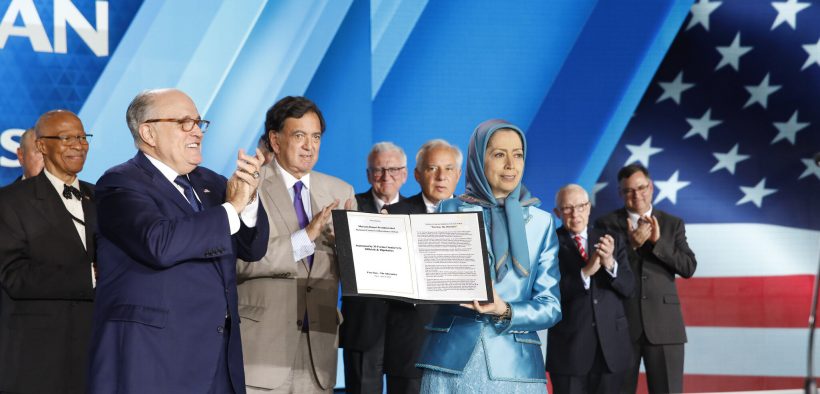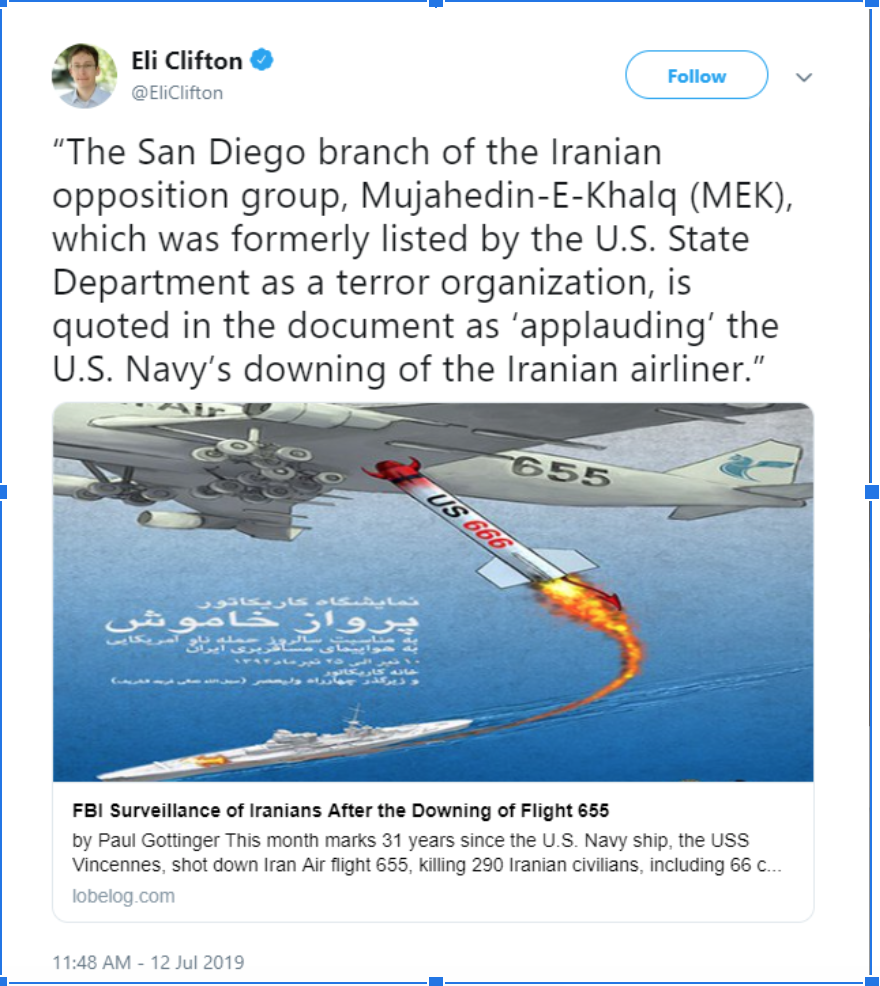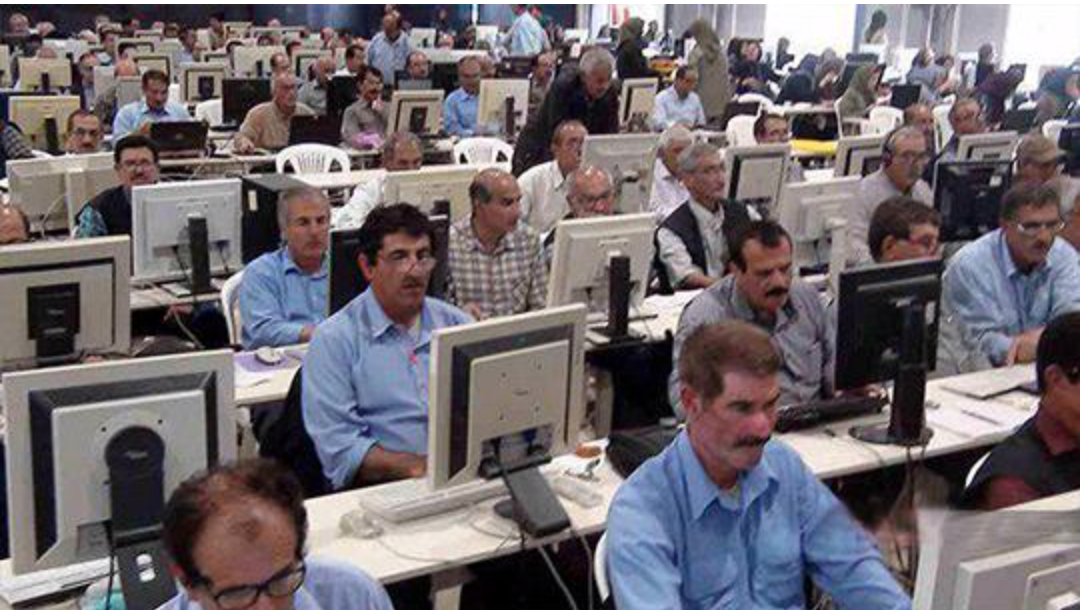Is the Trump Administration Allowing a Terrorist Group to Shape Its Iran Policy?

A now powerful player in the White House, the MKO/MEK group has become a force to be reckoned with, most likely to the detriment of peace.
In a rare move last month Congressional members crossed party lines to join in a bipartisan effort to curb U.S. President Donald Trump’s belligerent tweets and comments about Iran. The vote was not veto proof. At the same time, it appears the MKO/MEK, also known as the People’s Mujahedin of Iran, a group long opposed to the Iranian government, has the ear of the hardliners in the White House.
The Mujahedin-e-Khalq (MEK), which was once a sworn enemy of the United States, has over the past few years reinvented itself as a tactical ally to several Western governments in view of its desire to see Iran’s government collapse.
Often described as a cult by both experts and former members, the group was responsible for the killing of six Americans in Iran in the 1970s. At the height of 1979 Iranian Revolution the group cheered the storming of the U.S. embassy in Tehran, and the subsequent hostage crisis that followed. Fifty-two American diplomats were held hostage for a period of 444 days.
Such a history of violence and indoctrination was nevertheless ignored when party leaders Maryam and Masoud Rajavi offered to push for a modern-day regime change in Tehran and pose as the only viable alternative to what America sees as an absolute theocracy in Iran.
A report by Elizabeth Rubin published in 2003 in the New York Times, entitled: “The Cult of the Rajavi” best encapsulates the reality of the MKO/MEK.
In a move that coincided with calls in the Middle East for broad democratic reforms and an end to Western military interventionism, the United States announced its decision in 2012 to remove the MKO/MEK from its terrorism list.
While the MKO/MEK may disapprove of Tehran’s mullahs, in alignment with Washington’s narrative, its use of the adjective “democratic” hardly applies to what can only be described as a cult-like paramilitary organization revolving around the worship of its founders and leaders, Masoud and Maryam Rajavi.
For well over a decade now, Human Rights Watch has denounced the countless serious rights violations the MKO/MEK continues to perpetrate against both its members and those its leadership labels as its ideological opponents. A 28-page report sheds light on the abuses its members face should they dare disobey, including claims that those wishing to leave the group have been subjected to “lengthy solitary confinements, severe beatings and torture.”
In 2018, Rudy Giuliani, Donald Trump’s personal lawyer, addressed an MKO/MEK rally in Paris, calling for regime change in Tehran. The arrival of National Security Advisor John Bolton, one of the MKO/MEK’s most powerful and enthusiastic advocates, has given the group unprecedented proximity to the White House and a new lease of political life notwithstanding fears the White House has essentially aligned its policy on Iran with that of the group’s political dogmatism.
Addressing a crowd of MKO/MEK members, Bolton called in no uncertain terms for the fall of Iran’s regime and the rise of the extreme group.
“There is a viable opposition to the rule of the ayatollahs, and that opposition is centered in this room today … The behavior and objectives of the regime are not going to change, and therefore the only solution is to change the regime itself,” Bolton announced to the room.
“The outcome of the president’s policy review should be to determine that the Ayatollah Khomeini’s 1979 revolution will not last until its 40th birthday … The declared policy of the United States should be the overthrow of the mullahs’ regime in Tehran … The behavior and the objectives of the regime are not going to change and, therefore, the only solution is to change the regime itself,” Bolton continued.
Background and Influence
Believed to have between 5,000 to 13,000 members, the MKO/MEK was established in the 1960s as a reaction to the oppressive rule of Shah Reza Pahlavi, a mixture of both Marxism and Islamism. Born in violence, the group has seen its history peppered with calls for bloodshed and acts of terrorism.
In 1981 it led a series of attacks in Iran, which culminated with the killing of 74 senior officials, including 27 MPs. Later that year, its targeted bombing attacks claimed Iran’s president and prime minister’s lives.
Since the 1980s the group has lived in exile, first under the protection of late Iraqi dictator Saddam Hussein whose troops fought with MKO/MEK troops against Iran, then at the pleasure of several European governments, most notably France and Albania.
Eli Clifton, a fellow at the Nation Institute warned against the MKO/MEK’s influence in the U.S. noting, “When [MKO] members go and swarm Capitol Hill and seek meetings with the members of Congress, they’re very often the only voices that are heard, because there is simply not a lot of Iranian-American presence on Capitol Hill.”
Moreover, Clifton stressed how the organization, which operates through front groups, writes very large checks to those speaking at their events, thus subsidizing political support. Estimates are in the range of $30,000 to $50,000 per speech. Bolton is estimated to have received upwards of $180,000 to speak at multiple events. His recent financial disclosure shows that he was paid $40,000 for one speech at an MKO/MEK event in 2017.
In 2018 Trita Parsi, leader of the National Iranian American Council wrote on Twitter: “People, let this be very clear: The appointment of Bolton is essentially a declaration of war with Iran. With Pompeo and Bolton, Trump is assembling a WAR CABINET.”
That is not to say that all politicians and/or state officials, whether in the United States or in Europe, have fallen for the group’s clever play on identity politics. As demonstrated by Congress’ bipartisan efforts to curb hawkish cries for war on Iran, many still are willing to make no moves on Iran.
Over two dozen House Republicans joined Democrats to vote for a measure blocking President Donald Trump from taking military action against Iran without congressional approval. In the light of President’s propensity to push the limits of his executive prerogatives, such a measure comes as a welcome respite. The measure, introduced by Democratic Rep. Ro Khanna and Republican Rep. Matt Gaetz, would prohibit federal funds from being used for military action against Iran without the blessing of Congress. The measure passed 251-170.
“House and Senate leaders must recognize the will of Congress and include a strong provision to bar an unauthorized war with Iran in the final version of the defense bill that comes out of conference,” said Sen. Tom Udall (D-NM) in comments to the press.
Deception and Manipulation
Although many will take comfort in the measure, the White House remains too closely tied to the MKO/MEK for anyone to be callous about such political and ideological entanglement, especially if we consider what dire consequences we may all face should war break out in a region already plagued by unrest; notwithstanding the ever-present threat of Islamic radicalism, as expressed by Wahhabis and Salafis.
As a recent article by Murtaza Hussain in The Intercept states, the MKO/MEK has become too much of a reference point to Washington’s anti-Iranian stance for anyone to entertain any further, at least not if we are serious about acting on facts as opposed to fiction. And yes, in this instance the White House does appear to be collating “fake news” to formulate its Iranian agenda.
As the article infers, Washington’s data on Iran may not be real … at least not in a fashion befitting the most powerful military in the world.
The Intercept article reads: “In 2018, President Donald Trump was seeking to jettison the landmark nuclear deal that his predecessor had signed with Iran in 2015, and he was looking for ways to win over a skeptical press. The White House claimed that the nuclear deal had allowed Iran to increase its military budget, and Washington Post reporters Salvador Rizzo and Meg Kelly asked for a source. In response, the White House passed along an article published in Forbes by a writer named Heshmat Alavi.”
However, “Heshmat Alavi appears not to exist. Alavi’s persona is a propaganda operation run by the Iranian opposition group Mojahedin-e-Khalq, which is known by the initials MEK, two sources told The Intercept.” Alavi, the Intercepts posits, is but the product of a collective effort for war against Iran.
Hassan Heyrani, a high-ranking defector from the MEK who is said to have helped shape and directed similar disinformation campaigns in the past told the Intercept how Alavi’s online persona is “run by a team of people from the political wing of the MEK.”
“They write whatever they are directed by their commanders and use this name to place articles in the press. This is not and has never been a real person,” Hayrani further asserted.
While we may have all grown accustomed to Mr. Trump’s bellicose rhetoric and untruths, the possibility of a war with Iran to fit the ambitions of a group made infamous for its terrorist activities and cultish ideology ought to give us pause.
And though not all may look upon Iran’s current regime as ideologically pleasing, to argue change in favor of a group that disallows its members to marry for it would distract them from their political purpose and due worship of their leaders Masoud and Maryam Rajavi is ill-advised.
- MKO electronic army – Albania Courtesy of The Spring Institute, Tehran.
A well-oiled machine benefiting from the largess of Iran’s wealthy enemies in the region, for example, the Kingdom of Saudi Arabia, the MKO/MEK has long infiltrated both mainstream media and social media through the establishment of its electronic army. In an interview for Al Bawaba in 2018 Masoud Khodabandeh, a former high-ranking MKO/MEK official, shed light on Saudi Arabia’s financial support for the group, explaining how Riyadh regime has funneled, gold bars, cash and other valuables worth hundreds of millions of dollars through various third parties.
Among other revelations, Khodabandeh described how after the fall of Saddam Hussein in Iraq, Prince Turki bin Faisal Al Saud became the outfit’s main supporter.
“I would say that after the fall of Saddam, the MKO, which was then being run by Masoud [Rajavi] under the patronage of Saddam, changed to the organization run by Maryam [Rajavi] under the patronage of Prince Turki bin Faisal Al Saud,” he said.
Reports by several organizations and officials in Iran have revealed how deeply embedded the MKO/MEK is within the media to the extent that its data manipulation is now regarded as gospel by even the most well-established of news agencies.
Heshmat Alavi, whose factual existence has been put into question, for example, has been a regular in outlets such as Forbes, The Hill, the Daily Caller, and The Federalist, begging the question of media complicity to serve the group’s powerful political agenda.
A recent documentary published in Iran argues the group’s systematic manipulation of the media as its leadership attempts to present itself as the only democratic alternative to Iran’s current system of governance, the Governance of the Jurist, enticing ever-more willing war hawks to promote belligerence over diplomacy.
What Lies Ahead for MKO/MEK?
In recent weeks, a timeline that coincides with a hardening of tone against Iran, state officials and activists in Tehran have raised questions as to the group’s future based on Maryam Rajavi’s illness. Sources in Iran have confirmed they believe Mrs. Rajavi suffers from cancer, consequently putting the MKO/MEK’s immediate political sustainability under much uncertainty.
Masoud Rajavi, who has failed to appear in public for several years, is believed to reside in Albania, where the MKO/MEK relocated most of its members, most of whom are well into their 50s and 60s.
While groups such as the MKO/MEK, with an ideological premise that relies on a cult of personality, in this case, that of a couple, have for obvious reasons a limited reach, we ought not to discount its ability to muddy our geopolitical waters should their views be fanned under a hawkish anti-Iranian agenda.
If we consider how the group, as documented by the Intercept over the years has managed through heavy lobbying to wash away its terrorist past to now pose as an acceptable alternative to Iran’s current regime, to the tune of millions of dollars, the MKO/MEK’s ability to taint the broad geopolitical discourse through “influencers” should not be discounted, hence the importance of Congressional oversight on the U.S. Executive branch.
A report by Robert Mackey published in March 2018 issues a crucial warning:
“Despite such doubts that the MEK’s political wing, the National Council of Resistance of Iran, is any more reliable than Ahmad Chalabi’s Iraqi National Congress proved to be, spending lavishly on paid endorsements has earned the group a bipartisan roster of Washington politicians willing to sign up as supporters. At a previous gala in 2016, Bolton was joined in singing the group’s praises by another former U.N. ambassador, Bill Richardson; a former attorney general, Michael Mukasey; the former State Department spokesperson P.J. Crowley; the former Homeland Security adviser Frances Townsend; the former Rep. Patrick Kennedy, D-R.I.; and the former Vermont Gov. Howard Dean. That Paris gala was hosted by Linda Chavez, a former Reagan administration official.”
To disavow Iran politically should not translate into an alliance of convenience with groups we know to have promoted and perpetrated heinous acts of terrorism. Recent attempts at regime change in Libya and Syria, through the weaponization of less than desirable factions, on the basis that the end justified the means should serve as cautionary tales.
To offer more than an ear to a group, which not too long ago, rejoiced at the misfortune of U.S. diplomats certainly flies in the face of the America President Trump has been not only so keen on but vocal on defending and promoting.
To watch the MKO/MEK grow in strength and access ought at the very least to give us pause.


















How about a trade deal that includes China doing Washington’s decades of very dirty laundry? (Although I’m afraid that 1,386,000,000 folks with washboards might be too few for the job.)